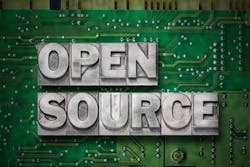Open Source Software Is Changing Automation
By now, you’ve likely seen a number of reports on the Open Process Automation Forum (OPAF). As interesting as the developments within OPAF are, it’s important to realize that the work of this group is but one facet of how open software and standards are changing the industrial automation marketplace.
During Inductive Automation’s Ignition Community Conference 2018, a panel discussion moderated by Inductive's Travis Cox featured Andy Stanford-Clark, IBM's CTO in the U.K. and Ireland, and a co-inventor of MQTT; Arlen Nipper, president and CTO of Cirrus Link, and a co-inventor of MQTT; Mike Milinkovich, executive director of the Eclipse Foundation; and Colby Clegg, co-director of software engineering at Inductive Automation.
The panelists focused on what end users need to realize about how the open software movement is influencing industrial software technologies. Looking first at the megatrend currently driving many new automation technology decisions—i.e., the Industrial Internet of Things (IIoT)—Milinkovich said it’s important to recognize that “the key word in IIoT is ‘Internet,’ and the fundamental building blocks of the Internet are open.” As examples of this, Milinkovich highlighted two examples: TCP/IP, the open protocol built at DARPA to survive a nuclear war and that now serves as the Internet’s communication protocol; and HTML, which was built at CERN to be the open language of websites.
“The accidental collision of these two open projects gave us the modern world,” said Milinkovich. “The whole idea of the Internet is to have open and interoperable systems.”
The IIoT will need to be based on open building blocks because, by definition, that's what it is, Milinkovich added, continuing: “The days when you can have open source—but only in closed systems—are over. If you think IIoT will happen, you have to think those gated systems will die. It's a market-driven phenomenon. If you believe in the walled garden, you believe in [machine to machine], not IIoT.”
In support of Milinkovich’s points, Nipper pointed to the ongoing success of MQTT, the open messaging protocol designed for industrial control system data collection. “MQTT has [now] established itself—64 percent of IIoT projects are using it," he said. "Large [technology] companies who have moved to MQTT are doing so at the urging of their customers. Those companies know they have to have it or they won’t be on the bid list.”
Highlighting how the complexity of modern software development is helping to drive the movement toward open source software, Stanford-Clark said new apps today aren’t started by building tens of thousands of lines of code; instead developers are now building on top of that using open source core code. "The genie is out of the bottle on open source, there’s no going back to the proprietary model [of how software used to be built]," Stanford-Clark said. "Of course, no one’s going to rip and replace everything [with open source] tomorrow, but we are on a journey [toward that]. The end has been defined.”
“We exist because there were open standards we could build on," Clegg said in reference to how important open source has been for Inductive Automation. "It’s helped us get to where we are today as fast as we have done it.”
Milinkovich pointed out that it’s important for users and companies who remain skeptical of open source software to realize that the people who build it are not like “some garage band of software developers. Projects like the Eclipse Foundation and Apache are professionally operated. The staff are paid by their employers to be a part of these organizations. We have professional standards.”
Working with organizations such as Eclipse provided a big boost to the development of MQTT. “We realized there was a vacuum in the market around the use of MQTT; everyone had it, but they weren’t doing much with it,” Nipper said. “That's why we developed Sparkplug at Eclipse—to define the namespace, payload and state in MQTT. Ninety-nine percent of MQTT implementations started in the Paho Project at Eclipse. So no one really owns [Sparkplug]. It is managed by the Eclipse Foundation.”
All the panelists noted that the clear advances being made by open source software do not necessarily mean that one day you, as a software user, won't have to deal with software vendors. Software vendors will continue to exist, creating different apps for different businesses on an open source base.
As software providers increasingly move toward this model, open source will give users the flexibility to choose different vendors and mix and match products, Milinkovich said, adding, “Open source doesn't mean people won’t be making money on software. But it does spur vendors to stay up to date to earn your business, because they’ll know you’ll always have choices with open source.”
About the Author
David Greenfield, editor in chief
Editor in Chief

Leaders relevant to this article:

